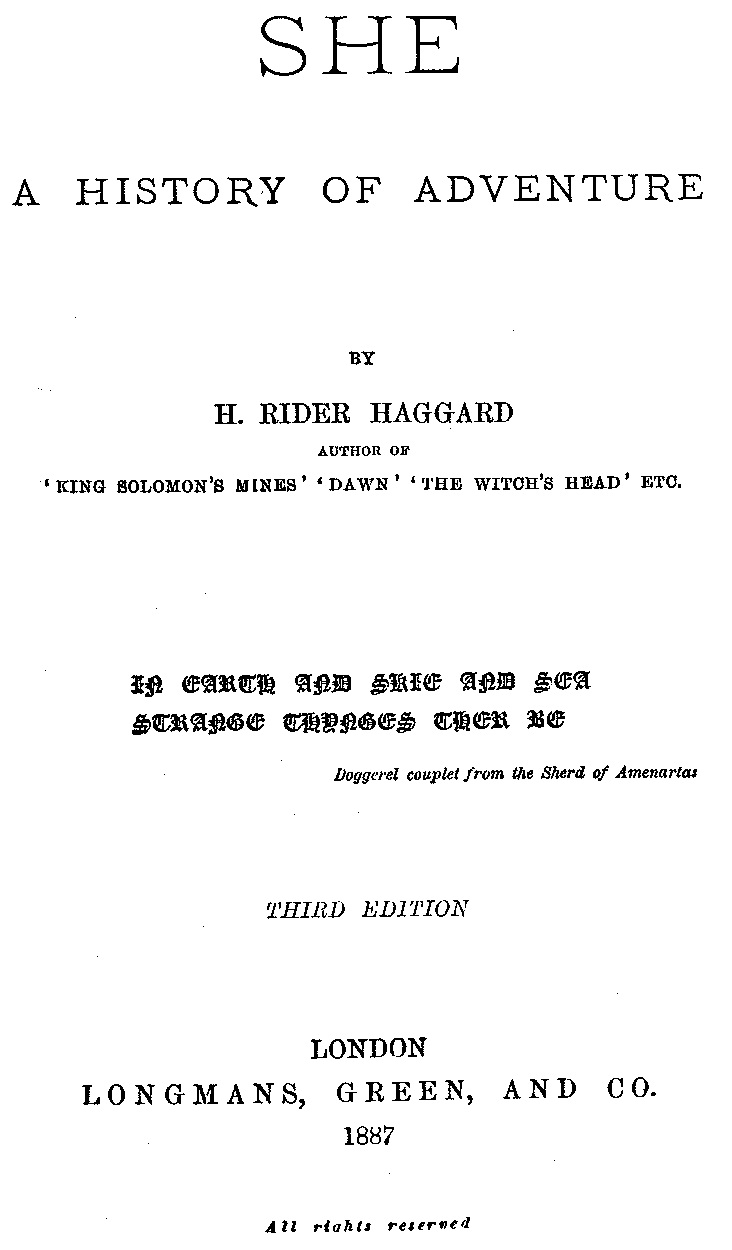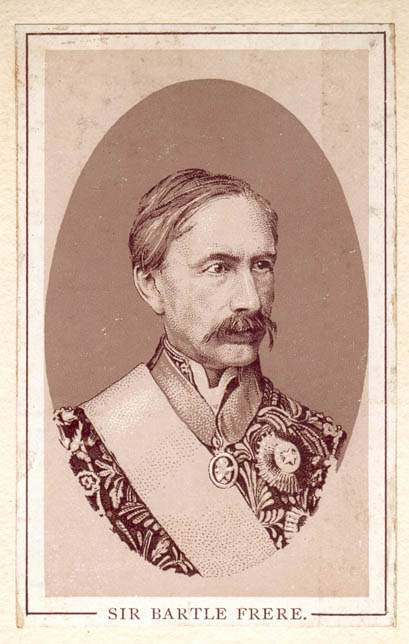|
She (novel)
''She:'' ''A History of Adventure'', is a Gothic novel by the English writer H. Rider Haggard, published in book form in 1887 following serialisation in ''The Graphic'' magazine between October 1886 and January 1887. ''She'' was extraordinarily popular upon its release and has never been out of print. The story is a first-person narrative which follows the journey of Horace Holly and his ward Leo Vincey to a lost kingdom in the African interior. They encounter a native people and a mysterious white queen named Ayesha who reigns as the all-powerful "She" or "She-who-must-be-obeyed". Haggard developed many of the conventions of the lost world genre which countless authors have emulated. Haggard was "part of the literary reaction against domestic realism that has been called a romance revival." Other writers following this trend were Robert Louis Stevenson, George MacDonald, and William Morris. Haggard was inspired by his experiences living in South Africa for seven years (18 ... [...More Info...] [...Related Items...] OR: [Wikipedia] [Google] [Baidu] |
Maurice Greiffenhagen
Maurice Greiffenhagen (15 December 1862 – 26 December 1931Tate Collection biography Tate Online, retrieved 27 Oct 2011) was a British painter and Royal Academician. He illustrated books and designed posters as well as painting idyllic landscapes.  He was born in London. Exhibiting at the Royal Academy of Arts from 1884, he was made an Associate Member in 1916 and a Royal Academician in 1922. From 1906 until 1926, he taught at the Glasgow School of Art. Greiffenhagen exhibited at the first e ...
He was born in London. Exhibiting at the Royal Academy of Arts from 1884, he was made an Associate Member in 1916 and a Royal Academician in 1922. From 1906 until 1926, he taught at the Glasgow School of Art. Greiffenhagen exhibited at the first e ...
[...More Info...] [...Related Items...] OR: [Wikipedia] [Google] [Baidu] |
She Title Page
She or S.H.E. may refer to: Language * She (pronoun), the third person singular, feminine, nominative case pronoun in modern English Places * She County, Anhui ** She Prefecture, 589-1121 * She County, Hebei * She River, or Sheshui, Hubei * Shetland Islands, IIGA country code People * She people ** She Chinese, a Sinitic language ** She language, a Hmong–Mien language, Guangdong * She (surname) * She (Qi) (died 613 BC), ruler * Empress She (died 397), Later Qin dynasty Literature and films * '' She: A History of Adventure'', an 1887 novel by H. Rider Haggard, and its film adaptations ** ''She'' (1911 film), a silent short film featuring Marguerite Snow ** ''She'' (1916 film), a silent film produced in the UK ** ''She'' (1917 film), a silent film starring Valeska Suratt ** ''She'' (1925 film), a silent film starring Betty Blythe ** ''She'' (1935 film), featuring Helen Gahagan ** ''She'' (1965 film), starring Ursula Andress ** ''She'' (1984 film), starring Sandahl Bergm ... [...More Info...] [...Related Items...] OR: [Wikipedia] [Google] [Baidu] |
Anthropological Society Of London
The Anthropological Society of London (ASL) was a short-lived organisation of the 1860s whose founders aimed to furnish scientific evidence for white supremacy which they construed in terms of polygenism. It was founded in 1863 by Richard Francis Burton and James Hunt. Hunt had previously been the secretary of the Ethnological Society of London, which was founded in 1843. When he founded the breakaway ASL, Hunt claimed that society had "the object of promoting the study of Anthropology in a strictly scientific manner". Nevertheless he reminded his audience that, whatever evidence might be uncovered, "we still know that the Races of Europe now have much in their mental and moral nature which the races of Africa have not got." The ASL only lasted 8 years: following Hunt's death in 1869 it was absorbed into the Royal Anthropological Institute of Great Britain and Ireland. Prelude to the ASL James Hunt had encountered the disgraced Edinburgh anatomist, Robert Knox in 1855. During th ... [...More Info...] [...Related Items...] OR: [Wikipedia] [Google] [Baidu] |
New Imperialism
In History, historical contexts, New Imperialism characterizes a period of Colonialism, colonial expansion by European powers, the American imperialism, United States, and Empire of Japan, Japan during the late 19th and early 20th centuries. The period featured an unprecedented pursuit of overseas territorial acquisitions. At the time, State (polity), states focused on building their empires with new technological advances and developments, Right of conquest, expanding their territory through conquest, and exploiting the resources of the subjugated countries. During the era of New Imperialism, the European powers (and Japan) individually conquered almost all of Scramble for Africa, Africa and parts of Western imperialism in Asia, Asia. The new wave of imperialism reflected ongoing International relations (1814–1919), rivalries among the great powers, the economic desire for new resources and markets, and a "civilizing mission" ethos. Many of the colonies established during t ... [...More Info...] [...Related Items...] OR: [Wikipedia] [Google] [Baidu] |
Zulu People
Zulu people (; ) are a native people of Southern Africa of the Nguni people, Nguni. The Zulu people are the largest Ethnic groups in South Africa, ethnic group and nation in South Africa, living mainly in the province of KwaZulu-Natal. They originated from Nguni communities who took part in the Bantu migrations over millennia. As the clans integrated, the rulership of Shaka brought success to the Zulu nation due to his improved military tactics and organization. Zulus take pride in their ceremonies such as the Umhlanga (ceremony)#South Africa, Umhlanga, or Reed Dance, and their various forms of beadwork. The art and skill of beadwork take part in the identification of Zulu people and act as a form of communication and dedication to the nation and specific traditions. Today, the Zulu people are predominantly Christian, but have created a Religious syncretism, syncretic religion that is combined with the Zulu's prior belief systems. History of the people of Zulu Origins Th ... [...More Info...] [...Related Items...] OR: [Wikipedia] [Google] [Baidu] |
David Livingstone
David Livingstone (; 19 March 1813 – 1 May 1873) was a Scottish physician, Congregationalist, pioneer Christian missionary with the London Missionary Society, and an explorer in Africa. Livingstone was married to Mary Moffat Livingstone, from the prominent 18th-century Moffat missionary family. Livingstone came to have a mythic status as a Protestant missionary martyr, working-class " rags-to-riches" inspirational story, scientific investigator and explorer, imperial reformer, anti-slavery crusader, and advocate of British commercial and colonial expansion. As a result, he became one of the most popular British heroes of the late 19th-century Victorian era. Livingstone's fame as an explorer and his obsession with learning the sources of the Nile was founded on the belief that if he could solve that age-old mystery, his fame would give him the influence to end the East African Arab–Swahili slave trade. "The Nile sources", he told a friend, "are valuable only as a m ... [...More Info...] [...Related Items...] OR: [Wikipedia] [Google] [Baidu] |
William Ewart Gladstone
William Ewart Gladstone ( ; 29 December 1809 – 19 May 1898) was a British politican, starting as Conservative MP for Newark and later becoming the leader of the Liberal Party (UK), Liberal Party. In a career lasting over 60 years, he was Prime Minister of the United Kingdom for 12 years, spread over four non-consecutive terms (the most of any British prime minister) beginning in 1868 and ending in 1894. He also was Chancellor of the Exchequer four times, for over 12 years. He was a Member of Parliament (United Kingdom), Member of Parliament (MP) for 60 years, from 1832 to 1845 and from 1847 to 1895; during that time he represented a total of five Constituencies of the Parliament of the United Kingdom, constituencies. Gladstone was born in Liverpool to Scottish people, Scottish parents. He first entered the House of Commons of the United Kingdom, House of Commons in 1832, beginning his political career as a High Tory, a grouping that became the Conservative Party (UK), ... [...More Info...] [...Related Items...] OR: [Wikipedia] [Google] [Baidu] |
Government Of The United Kingdom
His Majesty's Government, abbreviated to HM Government or otherwise UK Government, is the central government, central executive authority of the United Kingdom of Great Britain and Northern Ireland.Overview of the UK system of government : Directgov – Government, citizens and rights Archived direct.gov.uk webpage. Retrieved on 29 August 2014. The government is led by the Prime Minister of the United Kingdom, prime minister (Keir Starmer since 5 July 2024) who appoints all the other British Government frontbench, ministers. The country has had a Labour Party (UK), Labour government since 2024 United Kingdom general election, 2024. The ... [...More Info...] [...Related Items...] OR: [Wikipedia] [Google] [Baidu] |
Anglo-Zulu War
The Anglo-Zulu War was fought in present-day South Africa from January to early July 1879 between forces of the British Empire and the Zulu Kingdom. Two famous battles of the war were the Zulu victory at Battle of Isandlwana, Isandlwana and the British defence at Battle of Rorke's Drift, Rorke's Drift. Following the passing of the British North America Act 1867 forming a federation in Canada, Henry Herbert, 4th Earl of Carnarvon, Lord Carnarvon thought that a similar political effort, coupled with military campaigns, might lead to a ruling white minority over a black majority in South Africa. This would yield a large pool of cheap labour for the British sugar plantations and mines, and was intended to bring the African Kingdoms, tribal areas, and Boer republics into South Africa. In 1874, Sir Henry Bartle Frere, Bartle Frere was appointed as British High Commissioner for Southern Africa to effect such plans. Among the obstacles were the armed independent states of the South ... [...More Info...] [...Related Items...] OR: [Wikipedia] [Google] [Baidu] |
Transvaal Colony
The Transvaal Colony () was the name used to refer to the Transvaal region during the period of direct British rule and military occupation between the end of the Second Boer War in 1902 when the South African Republic was dissolved, and the establishment of the Union of South Africa in 1910. The borders of the Transvaal Colony were larger than the defeated South African Republic (which had existed from 1856 to 1902). In 1910 the entire territory became the Transvaal Province of the Union of South Africa. History Both the Boer republics, the South African Republic (ZAR) and the Orange Free State were defeated in the Anglo-Boer War and surrendered to the UK. The peace treaty (Treaty of Vereeniging) contained the following terms: # That all Burgher (Boer republics), burghers of the ZAR and Orange Free State lay down their arms and accept King Edward VII as their sovereign. # That all burghers outside the borders of the ZAR and Orange Free State, upon declaring their allegianc ... [...More Info...] [...Related Items...] OR: [Wikipedia] [Google] [Baidu] |
Colony Of Natal
The Colony of Natal was a British colony in south-eastern Africa. It was proclaimed a British colony on 4 May 1843 after the British government had annexed the Boer Republic of Natalia, and on 31 May 1910 combined with three other colonies to form the Union of South Africa, as one of its provinces. It is now the KwaZulu-Natal province of South Africa. It was originally only about half the size of the present province, with the north-eastern boundaries being formed by the Tugela and Buffalo rivers beyond which lay the independent Kingdom of Zululand (''kwaZulu'' in the Zulu language). Fierce conflict with the Zulu population led to the evacuation of Durban, and eventually, the Boers accepted British annexation in 1844 under military pressure. A British governor was appointed to the region and many settlers emigrated from Europe and the Cape Colony. The British established a sugar cane industry in the 1860s. Farm owners had a difficult time attracting Zulu labourers to wor ... [...More Info...] [...Related Items...] OR: [Wikipedia] [Google] [Baidu] |







